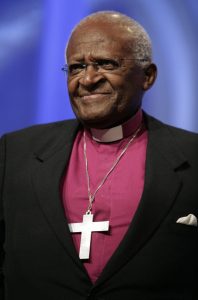I don’t make the following comments lightly or in a simplistic way. Life is a gift. Life is beautiful. Life is special: the fact that we are alive is something to be celebrated every day!
None of those comments are supposed to deny the reality of life: that life can be tough sometimes. I’ve written about him previously, but one of my heroes is the former Anglican Archbishop of Cape Town in South Africa, Desmond Tutu. He died two years ago, aged 90. He was instrumental in helping end the racist system of apartheid in South Africa. Where you were allowed to live, whether you were allowed to vote, what entrances and exits to public places you were allowed to use, were all dependent on the colour of your skin. As a black man, for most of his life, Desmond Tutu was not able to vote and during that time did not enjoy the other privileges that white South Africans enjoyed. He wrote in his book No Future without Forgiveness (great title!) the following, “There had been so many moments in the past, during the dark days of apartheid’s vicious awfulness, when I had preached, ‘This is God’s world and God is in charge!’ Sometimes, when evil seemed to be about to overwhelm goodness, I had only just been able to hold on to this article of faith.” Yet, in 1994, at the age of 62, apartheid came to an end and he was finally able to vote in the country of his birth.
This is how he describes that day, “The moment for which I had waited so long came and I folded my ballot paper and cast my vote. Wow! I shouted, ‘Yippee!’ It was giddy stuff, like falling in love. The sky looked more blue and beautiful. I saw the people in a new light. They were beautiful, they were transfigured. I too was transfigured. It was dream-like.”
Once apartheid ended, though, there was another really important task. Forgiveness had to be the way forward.
Forgiveness is not always easy. If you have been really hurt, forgiveness can be tough. Another South African also modelled forgiveness in his life. Nelson Mandela spent years in prison under the apartheid regime. However, thanks in large part to the last white president, FW de Clerk, apartheid had ended and free and fully democratic elections occurred for the first time. Nelson Mandela won the election and was elected the first black president of South Africa. Archbishop Desmond Tutu played a key part of his inauguration as President. Nelson Mandela knew that if the new South Africa was to survive – and not descend into a chaotic cycle of revenge-taking – forgiveness and reconciliation would have to be the way forward. The Truth and Reconciliation Commission, which Archbishop Desmond Tutu chaired, was a crucial initiative of the new government, because it offered amnesty for those who came forward and confessed the truth of their actions under the former regime. It was a key reason that society didn’t collapse completely.
As decent human beings, who believe in a just and fair society, we have to play our part. We have to strive for those things which build up society, with all the energy and the love God can give us. This means taking forgiveness seriously. It can be incredibly difficult! If you have been badly hurt, forgiveness is probably the last thing on your mind. However, it is absolutely critical. It is the only way to move into the future with freedom.
The Reverend Dr Theo McCall
School Chaplain

